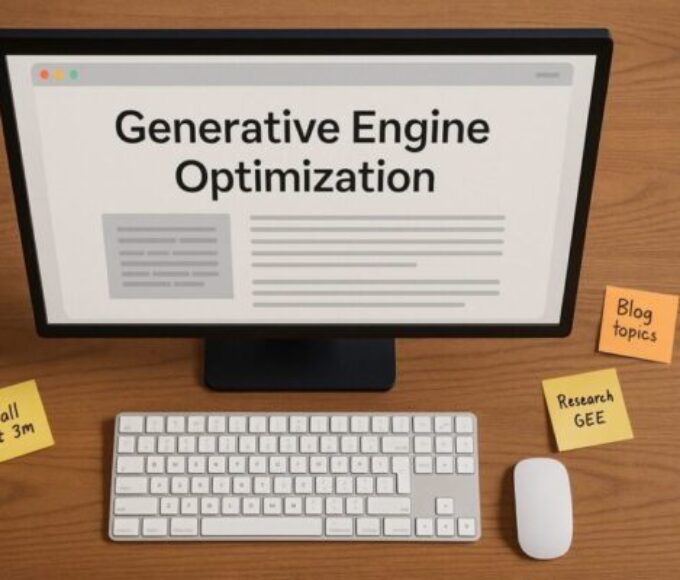
Generative Engine Optimization: The Future of Digital Growth
In an ever-evolving digital marketing arena, change is the only constant. While brands have gotten comfortable with traditional SEO, a new, more dynamic form of optimization is taking centre stage: Generative Engine Optimization, or GEO. As AI-driven platforms and content generation tools become the norm in digital experiences, GEO is more than a buzzword – it’s now central to any overall strategy for future proofing your business.
For every digital marketing agency in Israel, these changes have allowed for the opportunity to do things differently and redefine brands in how they interact with search engines and, more importantly, how search engines interact with generative content.
What is Generative Engine Optimization (GEO)?
Generative Engine Optimization (GEO) involves creating content not just for human eyes or search engines – this also includes generative AI platforms including ChatGPT, Google’s SGE (Search Generative Experience), or any large language model (LLM). Traditional SEO predominantly relies on backlinks, targeted keywords, and meta-data for rankings while GEO considers how AI engines digest, synthesize, and serve content.
Put another way, while SEO is primarily about optimizing for algorithms, like PageRank from Google, GEO is about optimizing for generative AI as a mechanism for retrieving and reconstructing your content for the end user. Subsequently, for any marketing agency in Israel looking to remain relevant, this next-gen optimization is a huge opportunity. GEO brings in aspects of structured data, conversational style, brand authority and contextual value – ensuring that your content is not only discoverable, but is also advised in real-time by AI tools.
Why Does GEO Matters More Than Ever?
With the rise of AI-assisted search, traditional results pages are giving way to AI-generated summaries and instant answers. That means your website content might not just be ranked — it might be paraphrased, referenced, or ignored based on how well it fits into an AI model’s training framework.
This shift presents both a challenge and an opportunity for digital marketing companies in Israel: how to evolve beyond basic optimization strategies and speak directly to both algorithms and AI-driven content engines.
GEO is about influence over indexing. It’s about crafting content that anticipates questions, addresses pain points, and reads like an intelligent conversation — all while embedding the right signals to be recognized by LLMs.
GEO vs SEO: Understanding the Key Differences
Let’s look at what sets GEO apart from traditional SEO, and why they should complement — not replace — one another:
|
SEO |
GEO |
|
Optimizes for search engine crawlers |
Optimizes for generative AI platforms |
|
Focuses on keyword density and backlinks |
Focuses on semantic clarity, authority, and tone |
|
Ranks content in search results |
Feeds content into AI outputs, summaries, and suggestions |
|
Relies on technical on-page elements |
Emphasizes narrative structure and question-based answers |
|
Measures clicks and bounce rates |
Measures mention, paraphrase, and citation by AI tools |
For modern marketers, especially those operating within high-growth regions like Israel, integrating both strategies is essential. If you’re a digital marketing agency in Israel, embracing GEO early gives your clients a competitive edge in how their brand voice is represented — not just on Google, but in AI-driven experiences across the board.
How to Implement GEO in Your Marketing Strategy
So how can your brand (or your clients) leverage Generative Engine Optimization effectively?
A. Understand the Role of AI in Search
Generative AI is no longer just a backend tool. It’s now a front door for content discovery. LLMs use vast training data — including blog content, FAQ sections, product descriptions, and reviews — to answer user queries. Ensuring your content fits within those structures is the first step.
B. Create Conversational, Context-Rich Content
AI thrives on natural language. That means your copy should be written with clarity, context, and real value. Instead of just including keywords like “marketing agency Israel,” build content around questions users ask:
- “What makes a marketing agency in Israel effective for startups?”
- “How do top digital marketing companies in Israel use AI?”
C. Focus on Topical Authority
GEO doesn’t reward surface-level content. Build deep, comprehensive resources on your topic. Become the go-to source. This boosts your chances of being referenced — not just by search engines, but by AI itself.
D. Maintain Structure and Scannability
Use clear headings, bullet points, and data-backed insights. Structured content is easier for AI models to digest and summarize. GEO loves clean design and clarity.
E. Prioritize Internal and External Citations
While traditional SEO leans on backlinks, GEO considers trusted signals. Linking to reliable sources and maintaining internal content clusters helps AI determine the reliability and depth of your content.
GEO: The Competitive Edge for Brands in Israel
Israel is quickly becoming a hub for marketing innovation. From Tel Aviv to Haifa, brands are competing to stand out — not just in local markets, but globally. GEO offers a powerful toolset for doing just that.
Being referenced by AI tools in real-time is like getting free PR at scale. It puts your content into the answers that your audience is already looking for — before they even know your brand name.
Agencies that are early adopters of GEO — like Brutal Marketing — are already helping businesses stay ahead of the curve by building content ecosystems that resonate with both human users and artificial intelligence.
Whether you’re a startup in need of exposure or a global brand with a presence in Israel, now is the time to rethink your strategy. GEO isn’t just about visibility — it’s about authority in the AI era.
Final Thoughts: GEO Is the Future of Digital Marketing in Israel
AI will become the preferred route to content, and Generative Engine Optimization will provide a framework for defining customers’ pathways to connect with brands online. For digital marketers within Israel, GEO is not an optional extra, it is the basis for the shift.
My suggestion of GEO doesn’t suggest that you have to stop working on SEO, rather you are enhancing your strategy, expanding your reach, and accommodating quality human content that ranks for AI. In the competitive digital marketplace, particularly in consumer-forward-thinking environments like Israel, that is a big deal.
If you are ready to enhance your brand’s voice, and want to start marketing with more than just considering keywords and rankings, it is time to switch to generative thinking.




